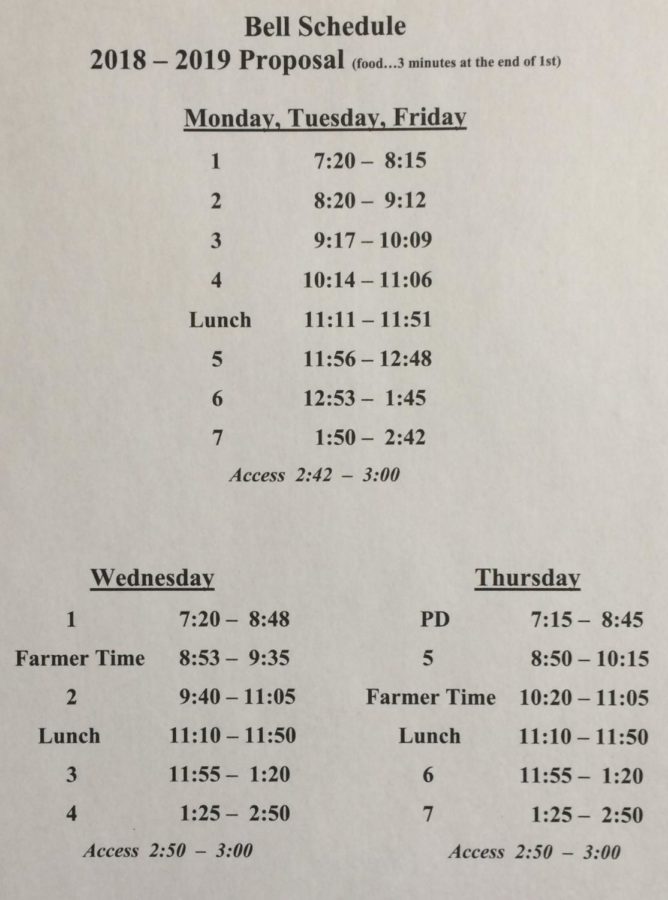Wheat Ridge Decides No Schedule Changes for Next Year
Next year’s revised bell schedule.
May 10, 2018
Hold onto your hats, Farmers, because there are going to be some big changes in the schedule next year: no student schedule changes, a one-lunch schedule, a mixed-class study hall on Wednesdays and Thursdays, and content planning for teachers.
Probably the most significant change among these is that next year, students will not be allowed to change their schedules except for specific, valid academic purposes. According to the new rules, the only valid reasons for a schedule change will be if the number of courses a student is taking doesn’t meet their minimum yearly requirement or set them on track to graduate, or if they need to change up or down a class level, like transferring to or from an Honors course based on their academic ability. Schedule changes based on students’ preferences of elective courses and off-hours will no longer be made.
The main issue that led to this decision is that so many students switch classes for non-academic purposes that class sizes can become majorly imbalanced. “This is a huge problem,” said principal Josh Cooley. “You could have one class of 32 kids, and the next one could be a class of seven. So many kids change their schedule that [the] master schedule we just built doesn’t really work anymore.” The current schedule policy also creates the possibility of classes filling up only to be dropped by many students at the beginning of the year, which could keep genuinely interested students from joining them. By changing the rules behind schedule changes, the administration hopes to avoid situations like this.
One downside of these new rules is that students will no longer be allowed to change their schedule to share classes or off-periods with friends. This will be a big change for those students who like going through their school day accompanied by their friends in most, if not all, of their classes. This will also significantly affect those who don’t have a full schedule and want to clump all their classes together at the beginning of the day so they can leave early.
Another major change that will come into effect next year is that instead of this year’s daily Freshman Seminar and Senior Advisement, there will be a study hall for students of all four classes every Wednesday and Thursday, informally called “Farmer Time” until the official name is finalized. Each classroom will have a random selection of students from each grade, and students will stay in the same one all four years. According to English teacher Matthew Couch, a member of the scheduling committee, it is both being made to give students a supportive teacher who they will be in weekly contact with all four years of high school, and also to see whether it’s best for sophomores and juniors to have a study hall in addition to the freshmen and seniors.
“Part of this is an experiment,” Couch said. “We’re going to test it out…[and] see what works [and] what doesn’t, and then we will modify accordingly. So maybe not every grade needs it, maybe every grade does, but we won’t know until we give it a go.” The addition of Farmer Time to the schedule will also free up a period for freshmen and seniors in which they previously had seminar or advisement.
Next year, we will also be moving to one 40-minute-long lunch period, as opposed to this year’s two 30-minute lunch periods. This will give students and teachers more time to eat, and hopefully lower the number of students who are late to class because they went off-campus to buy lunch. This also solves the potential problem of students not being allowed to change their schedule to share lunch-periods with their friends, as everyone will have the same lunch.
Another change that will be made to the schedule next year is that teachers have content planning periods. With this new setup, teachers will share planning periods with other teachers in their department, which will allow them to collaborate with others teaching the same subject during the day.
These are all big changes that will dramatically affect students’ and teachers’ school days, and we have yet to see how they will be received; but whether their reception is good or bad, let’s hope that they all benefit students by fostering a more effective learning environment.

